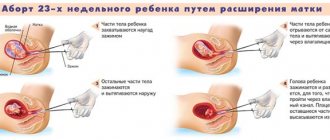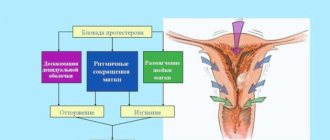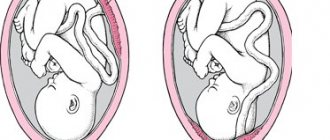Free consultation with a doctor by phone
Medical abortion is performed in the clinic daily by appointment!!!
LLC "Your Doctor"
Chat with the doctor
Addresses of medical centers in Moscow (unified reference) +7 (495) 255-45-59
Make an appointment at the clinic Discount on services Promotions
- +7 (495) 255-45-59
- Gynecological centers in Moscow
- Every day from 9.00 to 20.00
- call me back
Medical abortion is an artificial miscarriage or termination of pregnancy by taking a special drug. This drug blocks the production of a special pregnancy hormone, progesterone. As a result, the embryo stops developing, peels off from the walls of the uterus and comes out on its own when the smooth muscles of the uterus contract.
Useful information on the topic:
- Cleaning after abortion pills
- Medical abortion and breastfeeding
- How long do the tablets last?
- Discharge after abortion pills
- Types of abortion pills
- Abortion pills and smoking
How to do a pill abortion
Abortion is performed on an outpatient basis, without placing the woman in a hospital. First, the patient comes to the doctor’s clinic, where she is given the antigestagenic (antihormonal) drug mifepristone or its analogues. After this, the woman goes home, having the doctor’s phone number in her hands for communication.
Antigestagenic drugs block the hormone progesterone, which is necessary for the development of pregnancy and lead to its fading. This stage of interruption is painless and may not be accompanied by any sensations. In some cases, spotting and nagging pain in the lower abdomen appear.
After 24-48 hours, the patient will return to the clinic to take the hormonal drug Misoprostol, or one of its analogues. The drugs cause contraction of the uterus, which rejects the fertilized egg, pushing it out. At this stage, pain in the lower abdomen is observed, reminiscent of menstrual pain, and bleeding develops. This means that the pill abortion is successful.
If the drugs do not work, the woman needs to return to the clinic, where she will be given an additional dose of medication. This also needs to be done if vomiting occurs, which often appears in patients suffering from toxicosis. In this case, along with drugs for abortion, antiemetics are prescribed. For severe pain, painkillers are used.
During a pill abortion, you can only take medications prescribed by your doctor. Otherwise, bleeding may occur or the abortion pills may stop working. It is also not recommended to drink alcohol, as it causes vasodilation and increases bleeding.
Approximately 6 hours after the last dose of abortion pills, in 80% of cases a miscarriage occurs, but sometimes it occurs within 24 hours or later. The released fertilized egg has a spherical shape, and its size depends on the stage of pregnancy. After this, the discomfort in the lower abdomen decreases, the bleeding subsides, and the woman feels much better.
Some time after the interruption, you need to see a doctor to undergo an ultrasound. During the ultrasound examination, the doctor will make sure that there are no remnants of the fertilized egg in the uterus. The thickness of the endometrium is also measured, which after a tablet abortion is usually 15 mm or less, but generally ranges from 6.9-9.0 mm. After undergoing ultrasound diagnostics, you can be sure that everything went well.
It is important to get examined
If a woman has firmly decided to terminate her pregnancy, she should seek this service earlier. The doctor will prescribe examinations, which the woman undergoes in a day or two.
This is done in order to determine the maximum allowable dosage of the drug.
The drug causes bleeding, so it is very important to take into account the test results and the characteristics of the woman’s body. And it is for this reason that it is strictly forbidden to use abortifacient pills on your own at home.
Prices:
| Code | Name of service | Prices |
| 1 | Initial appointment | 1200 |
| 2 | Repeated appointment | 900 |
| 3 | Pelvic ultrasound | 1400 |
| 4 | Second trimester ultrasound | 1900 |
| 5 | Ultrasound of the third trimester | 2400 |
| 6 | Doppler 2-3 trimester | 1200 |
| 7 | Colposcopy | 1500 |
Until what time is a pill abortion performed?
The timing of an abortion is determined by the properties of the drugs used for its implementation. According to the instructions for the medications, this period is 42 days of amenorrhea, i.e. 6 weeks.
At a later stage, terminating a pregnancy using medications is risky, since the medications may not work and the woman will have an incomplete miscarriage. The fertilized egg will die, but will remain inside the uterus.
Therefore, in order to have time to make an interruption, you need to consult a doctor immediately after a delay occurs. Numerous scientific studies have found that the earlier an abortion is performed, the simpler and easier it is.
Therefore, to the question of how many weeks to perform a pill abortion, there is only one answer - the sooner it is performed, the better for the woman. With a slight delay, abortion resembles a normal delay in menstruation and does not cause significant discomfort.
Side effects of medications for abortion
Side effects of medications for medical abortion include:
- nausea and vomiting;
- headache;
- dizziness;
- weakness;
- discomfort in the lower abdomen;
- increase in body temperature.
The same symptoms often accompany menstruation and short-term miscarriage. Fever, nausea, and abdominal pain are easily relieved by taking classical medications. For example, you can take no-shpu.
Side effects associated with the procedure itself:
- pain in the lower abdomen;
- discharge of blood from the genital tract;
- exacerbation of inflammatory processes of the uterus and appendages.
Unfortunately, if there is inflammation of the internal reproductive organs, you will need to undergo treatment from a gynecologist.
Contraindications to medical abortion
- Suspicion of an ectopic pregnancy - to exclude it, an ultrasound is performed, showing that the embryo is in the uterine cavity.
- Exceeding the permissible interruption periods.
- Severe hormonal imbalance caused by dysfunction of the adrenal glands. Medical abortion is not performed during long-term therapy with drugs containing hormones.
- Severe dysfunction of the liver, kidneys, heart.
- High degree of hypertension
- Blood clotting disorders - in this case, tablet abortion is not performed due to the risk of bleeding.
- Porphyrias are diseases accompanied by impaired hemoglobin formation. With this disease, taking abortion drugs can significantly worsen the patient's condition.
Nausea and vomiting
Nausea and vomiting during medical abortion are quite common. At the same time, it is difficult even for doctors to determine what is causing it: the pregnancy itself or the effect of drugs.
Nausea and vomiting
As you know, toxicosis, which develops in the early stages, is characterized by nausea and vomiting. In women who do not suffer from toxicosis, such symptoms are also possible, and vomiting more often occurs after taking the drug misoprostol.
It must be emphasized that if vomiting begins immediately after taking abortion pills, you must inform your doctor; you may need to take the medication again, since it takes more than 2 hours for the body to absorb the active substance.
Discharge after pill abortion
After the expulsion of the fertilized egg, the woman continues to have spotting, which usually lasts 3-5 days.
Under the influence of hormonal substances used to terminate pregnancy, a disruption in the production of hormones may occur, accompanied by periodic reddish or brown discharge throughout the first menstrual cycle. This situation is not dangerous - the bloody “smudge” will gradually disappear.
In case of any discharge you should consult a doctor:
- Too much discharge after a pill abortion that panty liners are unable to absorb. This situation is caused by bleeding and requires the use of hemostatic agents.
- The discharge acquired an unpleasant odor and became yellowish or greenish. It is especially dangerous if this condition is accompanied by fever, headache, and worsening general condition. The situation often indicates the occurrence of an infection and requires the prescription of antibiotics.
- The flow of blood after the pill abortion suddenly stopped, but there was severe pain in the lower abdomen. These symptoms may be caused by a blood clot blocking the cervical canal inside the cervix. In this case, you will need medical help - a specialist will remove the clot and the blood flow will be normalized.
- There was no bleeding at all or it was very weak - spotting. This indicates a failed or incomplete abortion. In this case, the embryo may die but remain inside the uterus. The situation requires removal of the fertilized egg.
Misoprostol – why take it and what sensations it causes
2 days after taking Mifepristone, the patient is given another hormonal drug, Misoprostol, which causes uterine contractions. Its task is to separate the fertilized egg from the uterine wall and remove it. If this is not done, an incomplete abortion will occur. The dead embryo will remain inside the uterus, leading to bleeding and a purulent process.
Misoprostol is taken in a dosage of 400 mcg. Its effect begins quite quickly - the woman begins to experience spotting, which intensifies to the intensity of menstrual bleeding. Sometimes the volume of blood can be greater than during menstruation - it all depends on the individual characteristics of each woman and the duration of pregnancy.
If bleeding has not started 4 hours after taking the first two tablets, the woman is given another 400 mcg of the drug for medical abortion. In this case, the total dose is 400 mcg
Against the background of bleeding, the fertilized egg is released, looking like a round red formation. After this, all unpleasant sensations subside. This condition resembles a miscarriage, so a medical abortion, even the first one, does not cause as serious consequences as a surgical termination.
The release of the fertilized egg may be accompanied by cramping pain in the lower abdomen, radiating to the sacrum, coccyx, groin area, and lower back. Severe pain is usually observed during a medical abortion during the first pregnancy in a nulliparous woman.
Causes of pain during medical abortion:
- Late interruption period, approaching the limit of 7 weeks.
- Individual characteristics of a woman’s reproductive system – congenital anomalies (bicornuate, saddle-shaped uterus, presence of intrauterine septa), displacement of the uterus.
- Inflammatory processes of the genital area.
- Recent uterine manipulation (surgery, curettage).
- Low pain threshold
In this case, you can take painkillers prescribed by your gynecologist.
What to do after a pill abortion
- Do not lift weights, do not play sports, do not subject the body to physical stress.
- Refuse intimate life until your next menstruation.
- Don't overheat. Staying in the bathhouse, sauna, on the beach and in the heat is prohibited.
- Do not swim in ponds, bathtubs or pools. Water ingress can cause infection of the genital tract and lead to severe inflammation of the uterus, ovaries and fallopian tubes. During this period, you can only wash in the shower.
- Do not use tampons or douche.
- Do not take medications not recommended by your doctor. Even the most common medications - aspirin, analgin, ibuprofen, paracetamol can lead to bleeding.
Indications
Indications and contraindications for medical abortion
If you realize the fact of the need for an abortion and your term is up to 6 weeks, then the chemical method is the best option. The only indication for the procedure is the woman’s desire to terminate the pregnancy. The second condition is that the pregnancy must be intrauterine.
Absolute contraindications for the procedure:
- Asthma;
- Adrenal insufficiency;
- Age under 18 and over 35 years old.
Relative contraindications:
- blood clotting disorder;
- chronic diseases of the liver, kidneys, cardiovascular system; intrauterine device (it is recommended to remove it first, then carry out the procedure).
Important! After taking the first dose of the medicine, it is impossible to “change your mind” and decide to keep the child. Once a synthetic drug that contracts the muscles of the uterus has been ingested, the process cannot be reversed. Don’t give in to the first panic thoughts; you have a few weeks to finally make the right decision.
When does the next menstruation begin after a pill abortion?
Some women consider the bleeding that occurs after a pill abortion to be their period. In fact, this is not the case, since the release of blood in this case is associated with the rejection of the fertilized egg, that is, with an artificial miscarriage, and not with the menstrual cycle.
Real menstruation begins about a month after the fertilized egg is released. The onset of critical days may differ from usual ones - they may be shorter, longer, more abundant, scantier or more painful. Gradually the menstrual cycle will come and everything will return to normal.
Sometimes the first period after an abortion comes, but the next one does not. Such a delay can be caused not only by hormonal imbalance, but also by repeated pregnancy, so after a pill abortion you need to carefully protect yourself, since you can get pregnant in the next cycle.
Sometimes, after an interruption, critical days become irregular and painful, which is associated with hormonal imbalance or the development of inflammation. In this case, you need to consult a doctor who will prescribe treatment.
Tablet abortion is a gentle and easily tolerated method of terminating a pregnancy that does not require hospitalization, anesthesia, or insertion of instruments into the uterine cavity. Therefore, if your period is late, you should definitely go to a clinic, where experienced doctors will carry it out with minimal risk to the woman’s health.
MAKE AN APPOINTMENT
Abortion and contraception clinic in St. Petersburg - department of the medical gynecological association "Diana"
Make an appointment, tests or ultrasound via the contact form or by calling +8 (812) 62-962-77. We work seven days a week from 09:00 to 21:00.
We are located in the Krasnogvardeisky district, next to the Novocherkasskaya, Ploshchad Alexander Nevsky and Ladozhskaya metro stations.
The cost of a medical abortion in our clinic is 3,300 rubles. The price includes all pills, an examination by a gynecologist and an ultrasound to determine the timing of pregnancy.
Share link:
Headache and dizziness
Headache after taking medications develops quite often, in about 20% of cases. According to statistics, every fifth pregnant woman complains of headaches, especially in the first trimester.
Dizziness
This is usually due to the fact that the woman experiences emotional distress and stress during the abortion procedure. But this is not the only reason for headaches. Dizziness, weakness and low blood pressure are often caused by heavy discharge of blood from the uterine cavity. If a woman experiences a combination of heavy bleeding and dizziness, or a sharp drop in blood pressure, she should immediately consult a doctor.
Advantages of the method
- high efficiency of the method (95-98%);
- eliminates surgical intervention, injury to the uterine mucosa and damage to myometrial vessels;
- with medication interruption, a gentle, non-traumatic dilation of the cervix occurs;
- Medical abortion makes it possible to avoid general anesthesia;
- Medical termination is not a surgical procedure, so the risk of ascending infectious complications is very low (less than 1%);
- the risk of long-term consequences for the patient’s reproductive health is reduced, which is especially important for first-time pregnant women;
- Psychologically, it is easier for a woman to endure a medical interruption than a surgical operation under anesthesia.
Sources:
- Medical termination of pregnancy. Clinical recommendations (treatment protocol). — Ministry of Health of the Russian Federation, 2015.









